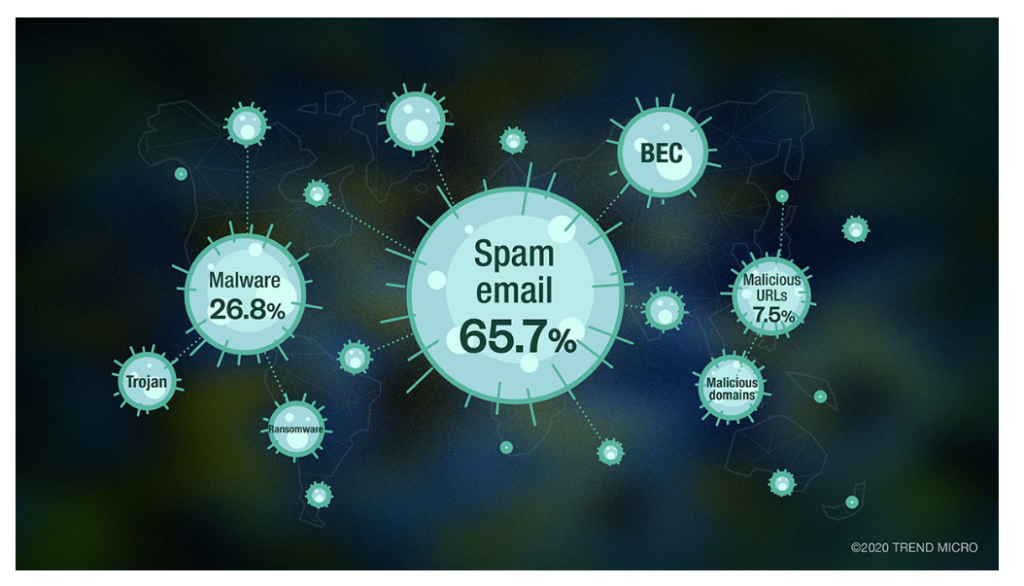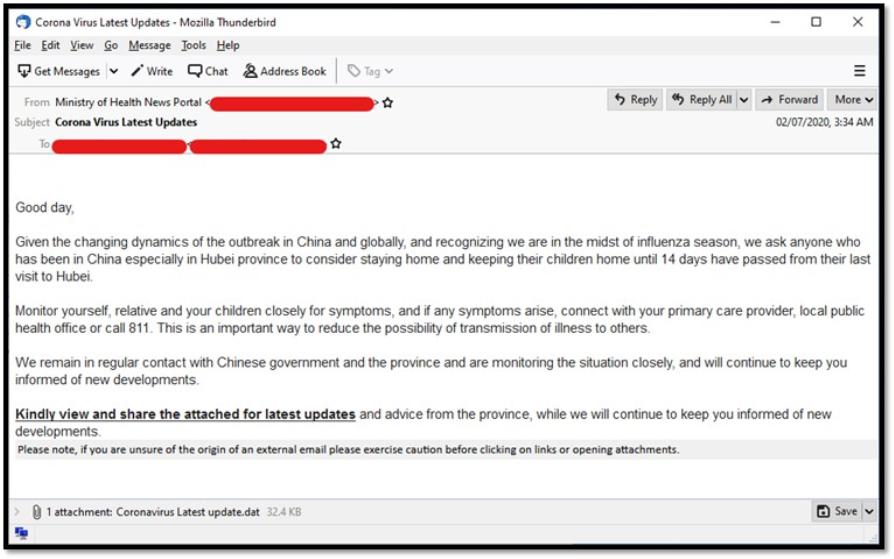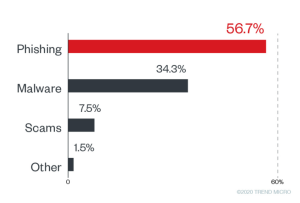
Sa pojavom virusa SARS-COV2, koji izaziva bolest COVID-19, primorani smo da brojne radne aktivnosti prenesemo na online režim. Značajno više provodimo vremena ispred računara, mobilnih uređaja koristeći internet najpre u poslovne svrhe, ali i za komunikaciju, kupovinu i informisanje o svim nama relevantnim temama. S obzirom na sve te aktivnosti, moramo da preduzmemo i određene akcije kako bismo najbolje zaštitili naše računare, naročito u slučajevima kada se povezujemo na mrežu kompanije.
Pošto je COVID-19 trenutno tema broj 1 u svetu, hakeri u velikoj meri koriste tu situaciju, što je dovelo i do značajnog porasta cyber kriminala. Brojni hakeri koriste COVID-19 situaciju, kako bi naveli korisnike da instaliraju različite maliciozne softvere, sve u cilju dolaženja do osetljivih podataka korisnika, lozinki, praćenja aktivnosti korisnika na sistemu i slično.
Iz nekoliko izvora smo prikupili informacije, na koji način hakeri najčešće deluju i koje su to aktivnosti cyber kriminala na koje bi trebalo da obratimo pažnju.
Naziv COVID-19 naročito se koristi za spam, malware fajlove i za maliciozne domene.
RiskIQ je analizirao feed sa spam poljem za vremenski period od 30.03-31.03.2020. Tokom ovog perioda, analizirano je 217,169 neželjene e-pošte koja sadrži ili „corona“ ili „covid“ u naslovu emaila.

Različiti su načini koje hakeri koriste kako bi sproveli svoje akcije u delo, samo neke od njih su:
Phishing kampanje i distribucija zlonamernog softvera se vrši putem veb adresa, naizgled originalnim lokacijama ili putem dokumenata koji pružaju informacije ili savete o COVID-19 i koriste se za zarazu računara i preuzimanje korisničkih akreditiva. (IZVOR)
Spam – Posebnu pažnju bi trebalo da obratite na emailove koje dobijamo iz raznoraznih izvora, jer hakeri najčešće koriste ovaj vid napada na računar korisnika, koristeći upravo naziv COVID-19, kako bi naveli korisnika da otvori email ili preuzme navodnu brošuru iz emaila.

Malicious websites – Takođe, hakeri koriste i plasiraju raznorazne maliciozne sajtove na koje će korisnici u cilju informisanja nesmotreno da kliknu i ugroze svoj računar. Kroz botnet, akteri pretnji mogu da pokrenu DDoS napade, da preuzimaju fajlove sa vašeg računara, da izvršavaju skripte, da snimaju snimke ekrana, da kradu bitcoin novčanike i prikupljaju kolačiće i lozinke pretraživača.
Primeri takvih sajtova su antivirus-covid19[.]site i corona-antivirus[.]com, koji promovišu aplikaciju koja će navodno zaštiti korisnika od virusa COVID-19, pri čemu, kada korisnik instalira aplikaciju, njegov sistem napada BlackNET Rat malware. (IZVOR)
Ransomware – Napad za koji se pretpostavlja da je izazvao ransomvare pogodio je Univerzitetsku bolnicu Brno u Češkoj, test centar za COVID-19. Računarski sistemi u bolnici bili su zatvoreni zbog napada, što odlaže puštanje rezultata ispitivanja COVID-19. (IZVOR)
Fraud – plasiranje proizvoda koji su neophodni u slučaju pandemije, poput maski, dezinfekcionih sredstava ili drugih medicinskih preparata, a da pritom fizički nikada nećete dobiti poručene proizvode, sve u cilju uzimanja novca korisnicima. (IZVOR)
Plasiranje lažnih informacija je takođe jedan vid cyber kriminala u cilju stvaranja panike kod ljudi. (IZVOR)

Neki od primera malicioznih softvera su:
- “Corona Virus” Trojan – ciljajući na Windows, ovaj trojanski program oponaša stvarnu mapu globalnih lokacija infekcija COVID-19 kako bi naveli korisnike da preuzmu zlonamerni softver, koji potom krade korisničke akreditive i druge lične podatke.
- CovidLock Android Ransomware – Android aplikacija koja se pretvara da korisnicima pruža način da pronađu pacijente COVID-19 u blizini i prate širenje virusa širom sveta. Instaliranjem aplikacije zaključava se uređaj i traži od korisnika da plati 250 dolara otkupnine za bitcoine.
- Corona Safety Mask SMS Scam – pretvarajući se da je aplikacija koja pomaže korisnicima da pronađu sigurnosne maske, prikuplja kontakte i SMS poruke poruke korisnika, a zatim šalje neistinite poruke kontaktima žrtve.
Mere zaštite od Cyber kriminala:
(Prilagođeno prema izvoru)
- Budite oprezni sa mejlovima i fajlovima koje dobijate od nepoznatih pošiljaoca, naročito ako vam nude posebne ponude ili popuste
- Budite oprezni sa linkovima u mailovima, kao i sa fajlovima koji vam stižu od nepoznatih izvora
- Poručujte proizvode online od proverenih izvora
- Informacije o Covid-19 tražite samo na proverenim i zvaničnim stranicama, koje su kreirane u te svrhe
- Svoje podatke poput korisničkog imena, šifre, podatke sa svojih kreditnih kartica, nipošto nemojte da otkrivate, jer zvanične institucije vam to nikada neće tražiti, naročito ne putem emaila.
- Obezbedite adekvatne alate za zaštitu od različitih cyber napada (https://saga.rs/cybersecurity/)



